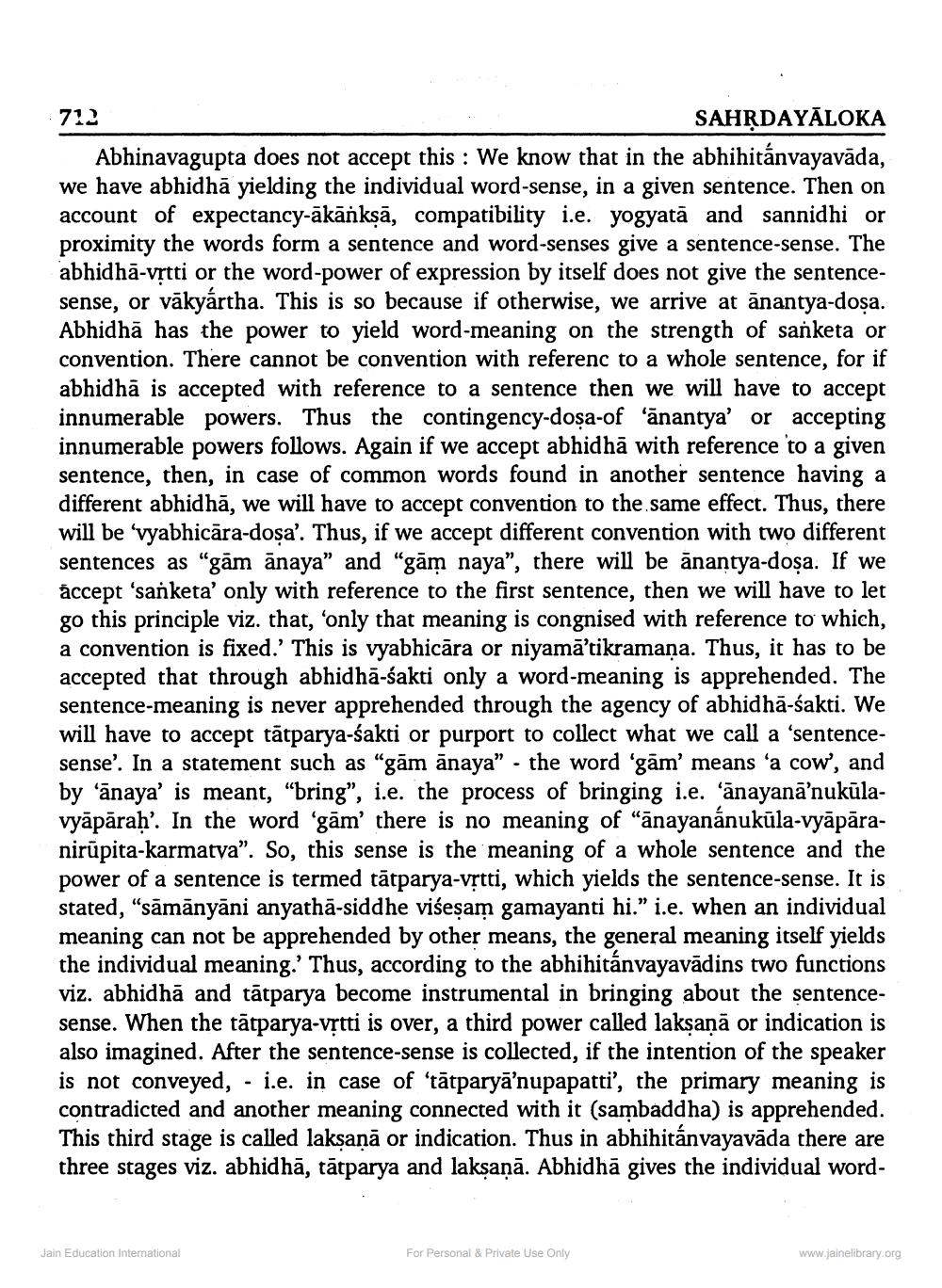________________
712
SAHRDAYĀLOKA Abhinavagupta does not accept this : We know that in the abhihitánvayavāda, we have abhidhā yielding the individual word-sense, in a given sentence. Then on account of expectancy-ākāńksā, compatibility i.e. yogyatā and sannidhi or proximity the words form a sentence and word-senses give a sentence-sense. The abhidhā-výtti or the word-power of expression by itself does not give the sentencesense, or vākyártha. This is so because if otherwise, we arrive at ānantya-dosa. Abhidhā has the power to yield word-meaning on the strength of sanketa or convention. There cannot be convention with referenc to a whole sentence, for if abhidhā is accepted with reference to a sentence then we will have to accept innumerable powers. Thus the contingency-dosa-of 'ānantya' or accepting innumerable powers follows. Again if we accept abhidhā with reference to a given sentence, then, in case of common words found in another sentence having a different abhidhā, we will have to accept convention to the same effect. Thus, there will be 'vyabhicāra-dosa'. Thus, if we accept different convention with two different sentences as “gām ānaya” and “gām naya”, there will be anantya-dosa. If we accept 'sanketa' only with reference to the first sentence, then we will have to let go this principle viz. that, 'only that meaning is congnised with reference to which, a convention is fixed.' This is vyabhicāra or niyamā’tikramana. Thus, it has to be accepted that through abhidhā-sakti only a word-meaning is apprehended. The sentence-meaning is never apprehended through the agency of abhidhā-sakti. We will have to accept tātparya-sakti or purport to collect what we call a 'sentencesense'. In a statement such as "gām ānaya”. the word 'gām' means 'a cow', and by 'ānaya' is meant, “bring", i.e. the process of bringing i.e. 'ānayanā’nukūlavyāpārah'. In the word 'gām' there is no meaning of "ānayanánukūla-vyāpāranirūpita-karmatva". So, this sense is the meaning of a whole sentence and the power of a sentence is termed tātparya-vrtti, which yields the sentence-sense. It is stated, "sāmānyāni anyathā-siddhe visesam gamayanti hi." i.e. when an individual meaning can not be apprehended by other means, the general meaning itself yields the individual meaning.' Thus, according to the abhihitánvayavādins two functions viz. abhidhā and tātparya become instrumental in bringing about the sentencesense. When the tātparya-vịtti is over, a third power called laksaņā or indication is also imagined. After the sentence-sense is collected, if the intention of the speaker is not conveyed, - i.e. in case of 'tātparyā’nupapatti', the primary meaning is contradicted and another meaning connected with it (sambaddha) is apprehended. This third stage is called laksaņā or indication. Thus in abhihitánvayavāda there are three stages viz. abhidhā, tātparya and laksaņā. Abhidhā gives the individual word
Jain Education Interational
For Personal & Private Use Only
www.jainelibrary.org




